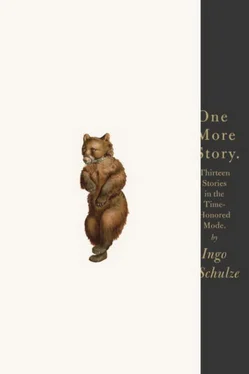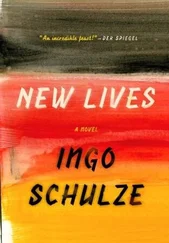Arne on the other hand looked somehow younger — his beret cocked back on his head.
“If you can keep a secret,” he called over, “I have something to show you.” With a wide swing of his arm, he directed us to take our place behind him, inserted the key in the rear door of the Barkas, and opened it a crack. He peered into the van and then with a clownish pantomime urged us to do the same. I assumed Arne’s daily encounters with schoolchildren were to blame for his exaggerated performance.
It was dark inside the van, and I recoiled from the foul odor. Tanya took more time. Then she glanced at me and said in a voice that sounded as if I had just asked her the time, “A bear, there’s a dead bear lying in there.”
Arne had dragged over one of those wooden pallets. Tanya opened the door till it caught in place, and Arne and I propped up the pallet to make a ramp. Arne took up his post beside it, Tanya and I retreated behind the opened door.
The bear didn’t stir.
We watched as Arne pulled a can from his jacket pocket and, after opening it with his fingernails, plunged a stick into it. He handed me the stick, nodded as if to thank me or as if we had agreed on some signal, clapped his hands three times, and cried, “Seryosha! Seryosha!” He clapped three more times, took back the stick, and held it out in front of him like a fishing pole.
I’m really not all that much of a wimp, but when, at no more than an arm’s length, the bear’s head emerged from the darkness, I had a sense of the aptness of the idiom “so scared I almost shit my pants.” “Let’s get out of here,” Tanya whispered. Arne, however, armed with just a honey-smeared stick, showed no sign of the jitters. He waited in front of the pallet with his legs astraddle, bending farther and farther forward — and given his height, it looked like some sort of gymnastics. The bear stretched its head out even farther but still refused to crawl down the pallet. Arne held the stick so close to Seryosha’s mouth that he could take a lick and bite off a piece. He crunched the stick as he dined, and growled. From childhood on we learn that bears growl. But when you actually hear that ursine rumble, without the protection of a moat or a fence, it leaves a lasting impression.
Strangely enough my confidence was boosted less by Arne’s honey-stick gambit than by the bear’s behavior. When you know how this story ends, that seems a facile observation, but from the start I had the impression that this bear had himself under control, that he knew what he was allowed and not allowed to do. He stuck out a paw and pushed the pallet away from the van, measured the distance between the edge of the van’s bed and the pallet lying below it, shifted his weight from one paw to the other, reached down farther with his right paw, and leaped out so quickly that Arne would have been knocked over if he hadn’t performed a reverse buckjump. At the same moment the Barkas bounced with a metallic squeak.
Arne made a few quick jabs at the can. The crunching sound resumed. And then it happened. At first I thought the bear was turning toward us. But then he kept going, spun around once in place, and then a second time, because Arne was applauding him. He turned and turned, swinging the rope around his neck with him. When we joined the applause, he suddenly stopped, lurched forward and backward as if dizzy, and ended with a somersault that was a little off kilter but still counted as a somersault. For his finale, the bear plopped down on his rear end and raised his paws, begging.
Whether Arne’s stick was now too short or whether he was following instructions, at any rate he pulled out a handkerchief, dipped it in the can of honey, and tossed it to Seryosha, who simultaneously tore it to shreds and stuffed it in his mouth. Smacking his lips and grunting, he lowered himself onto all fours and set off on a stroll across the lawn. Arne had removed a basket of fruit from the passenger seat. He now tossed Seryosha a couple of apples and strewed the rest over the bed of the van. Seryosha actually turned around and jumped up into the Barkas, which settled onto its rear axle with a squeak.
It wasn’t until weeks later, after we had told the story of Seryosha many times, that it struck me just how curious this little interlude outside Arne’s house actually was. Why, after all, had Arne enticed the bear out of the van? Had he wanted to play wild-animal trainer for us? Had his vanity gotten the better of him? Was that the reason he had risked discovery?
Arne invited us to accompany him. And so, for the first time since our hitchhiking days, Tanya and I found ourselves squeezing into a Barkas — but unlike back then, Tanya climbed in first.
What I ask myself now is: Why didn’t I jot down a single note while we were in Käsmu? Driving through the woods were an Estonian and a German writer, along with his one and only love, plus a bear in the back of their van — and it never once dawned on me that all I had to do to provide my hosts with the story they wanted was to write down what I was experiencing at that moment.
It would of course be an improvement if I could reproduce Arne’s speech in the original. His German was tinged with the now-defunct East Prussian dialect, but I’m simply unable to replicate its odd syntax and broad vowels. Chugging out of the village in second gear, we at first said nothing. Arne was apparently enjoying keeping us in suspense and pretended that his slalom course to avoid potholes demanded his full attention.
“What kind of bear is it?” Tanya finally asked. In her attempt to look Arne in the eye, she bent so far forward that her forehead almost touched the windshield. “What are you doing with a bear?”
Arne smiled — a pothole sent us lurching forward. Arne cursed.
“Did you hear that?” Tanya exclaimed. “He growled, he’s growling.”
A couple of slalom maneuvers later, Arne began to speak, but what he had to say apparently had nothing to do with Tanya’s question. He explained that the Writers Union was poor because its writers were poor. Except for one member, not a single writer in Estonia was able to live from his books, although of course the union also received a government subsidy. And for the quartermaster — that was in fact the term he used — for the quartermaster of a writers’ retreat there was really not much left over, and he couldn’t depend on the standard practice of tipping in their case either. Once in a while he let a few villagers use the sauna, but they paid, if at all, in produce. As far as his museum work went, all he got out of it was what he squeezed out of it himself. Even ten buses a day wouldn’t do the job. “So, chto delat ?” he asked in Russian. What was Arne to do?
But why was he taking a trained bear for a joyride through the woods?
Arne was looking for a turnoff. We drove at a snail’s pace along the rutted path. Arne talked about the revolution, as he called it. They had achieved everything they had wanted: independence, democracy, a market economy, and soon the European Union. Except that by now all the islands and coastal properties had been sold to Finns and Swedes, some to Russians and Germans too, plus the finest houses in Tallinn. There was truly nothing left that hadn’t been privatized and incorporated into the market economy. So what now?
Whenever we drove over a root or through a deep puddle, we could hear Seryosha’s growls.
The only difference from the old days, Arne said, was that from time to time some Westerner might get lost and end up in Käsmu. And that there was nobody to tell him how to run his museum anymore.
Arne turned on his headlights because the fir trees had closed in over the path, so that it was like driving through a tunnel. After an eternity of two or three kilometers, a heather-covered clearing opened up before us. Arne stopped, turned off his lights, pulled the key out of the ignition, and leaned back with arms folded.
Читать дальше












